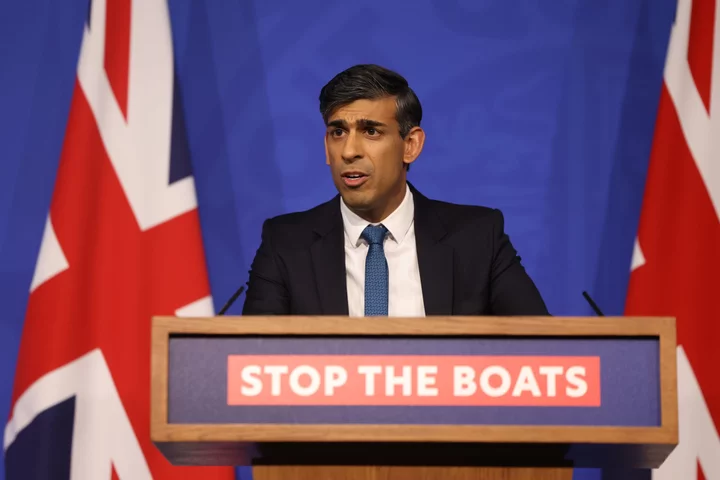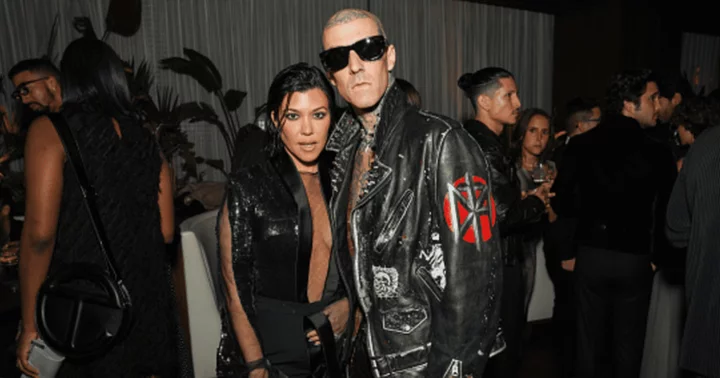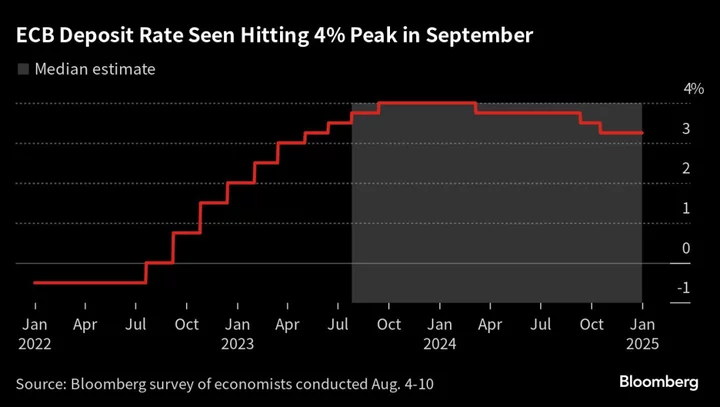
United Methodists lose one-fifth of US churches in schism driven by growing defiance of LGBTQ bans
More than 6,000 United Methodist congregations have now received permission to leave the denomination amid a schism over theology and the role of LGBTQ people
2023-07-06 21:17

‘Brutal’ Marines training helped Gareth Southgate pick Harry Kane as captain
The Royal Marines told England boss Gareth Southgate that Harry Kane would make the perfect captain, the striker has revealed. The Bayern Munich player heads back to Scotland for a friendly at Hampden Park, where he first skippered the national team, on Tuesday. Six years ago Southgate took his squad for a surprise weekend at the Commando Training Centre Royal Marines in Devon. They camped, hiked and were dunked in the feared sheep dip as the Marines tested their physical and mental strength during a boding exercise which helped Southgate decide his skipper. A few days later, Kane was handed the armband and scored a last-gasp leveller in the 2-2 draw in Glasgow. “I remember that trip very clearly,” he said. “We had a fantastic time and I think Gareth did use that to see who stood out in terms of leadership. “Leadership comes in many ways. It isn’t just the guy in the front shooting the paintball. Maybe the way I got on with the Marines and the way I handled certain situations. “I know that Gareth asked some of the Marines afterwards who they thought were natural leaders, who were approachable and who other players were leaning towards to talk to. Things like that. “I think that might have helped in me becoming captain. It was a fantastic few days. Some great memories that will be with me forever. “It helped the whole squad get to know each other. We had no phones for three days, we were camping in the woods. That helped us, not just as a team. It helped us become closer. “We did a camping thing where we learned to put up our own tents and had the rations the Marine guys have when they’re going to war. “We woke up at sunrise and did a trek with all the stuff on our backs. Then we did an obstacle course. That was fun, although I think they left out some of the tougher parts. “We had to follow the Marines. Whenever they shouted ‘down’ we had to crawl in the mud, though stones and the sheep dip. “So we were all soaking wet, with sand and mud everywhere, and we thought we were going to get in a car and go back to camp, until they told us we were walking back – which was another hour on the road. That was probably the hardest part, it was mentally tough. I know that Gareth asked some of the Marines afterwards who they thought were natural leaders, who were approachable and who other players were leaning towards to talk to. Things like that. I think that might have helped in me becoming captain Harry Kane “Then we got back to the place we were staying. I was looking forward to a nice, hot shower and it was just a bit of water dripping out. It was just brutal.” Kane returns to Hampden as England’s record-breaking skipper with 58 goals in 84 caps. Back in 2017, Kane scored just his sixth international goal with a close-range volley from Raheem Sterling’s inch-perfect pass and remembers the World Cup qualifying draw well. “First of all I was extremely proud to be leading the boys out and I thought it was an amazing atmosphere, even from the national anthems,” said the 30-year-old. “The noise at Hampden Park is still one of the best atmosphere’s I’ve been a part of. The game was OK. We got ahead and then they quickly turned it around with two great free-kicks and then you’re thinking about being an Englishman losing to Scotland. “That isn’t the most ideal situation – especially when it’s your first game as captain, so it was nice to score in the last minute. “To be honest, I don’t think I realised how important the goal was until after the game, then I heard all the talk around it. For me, not to lose my first game as captain was important and it’s a nice memory.” Kane has linked up with England for the first time since his £100million move from Tottenham to Bayern. He has scored three goals in his first three starts and slotted into life in Germany, including a club photoshoot while dressed in Lederhosen and posing with fake beer. He said: “It was alright actually. The shorts were a bit heavier than I thought. It wasn’t even real beer – it was just to look good. “We have a day when all the players and staff go to Oktoberfest. I don’t know when that will be, but I’ve heard it’s really good.” Read More Charity boss speaks out over ‘traumatic’ encounter with royal aide Ukraine war’s heaviest fight rages in east - follow live Brennan Johnson has the potential to reach ‘highest of levels’ – Neco Williams George Ford masterclass earns 14-man England an opening World Cup win New Italy boss Luciano Spalletti denied first win as North Macedonia fight back
2023-09-10 06:17

Trump will make case to evangelical voters at key 2024 GOP audition
Former President Donald Trump is set to address evangelical Christian voters at a major gathering Saturday in Washington, where he will seek to shore up their support as his legal troubles mount and rivals take aim at his character.
2023-06-24 18:21

Peterson's 2 homers help A's beat Pirates, end 15-game road skid
Jace Peterson homered twice on a five-hit night and drove in five runs, and the Oakland Athletics ended a 15-game road losing streak with an 11-2 victory over the Pittsburgh Pirates
2023-06-07 10:15

EU Is Bystander in Musk’s X Drama as Powers Yet to Kick In
The European Union enacted a slew of new rules earlier this year to fight the kind of hate
2023-11-18 00:17

Cart crash delays Lyles race at world championships and leaves Jamaica's Hudson with blurry vision
A collision involving a cart carrying Noah Lyles and his opponents in the 200-meter semifinals at world championships sent glass shards flying into the right eye of Jamaica’s Andrew Hudson, forcing him to race with blurred vision
2023-08-25 03:51

Benteke brace gives Rooney's D.C. United playoff boost
Christian Benteke scored twice as DC United delivered a timely boost for manager Wayne Rooney and their playoff hopes with a 4-0 win over the Chicago Fire...
2023-09-03 12:55

Sunak Says ‘Not Focused’ on UK Election, Won’t Discuss Timing
Prime Minister Rishi Sunak said that the UK’s next general election wasn’t a priority for him right now,
2023-11-27 06:47

Bournemouth boss Andoni Iraola claims maiden Premier League win over Burnley
Bournemouth boss Andoni Iraola claimed his maiden Premier League victory at the 10th time of asking with a 2-1 comeback win over Burnley thanks to a sensational 40-yard lob by Philip Billing and a lengthy video assistant referee call. While internally Iraola had been under no pressure at Vitality Stadium, the noise externally was growing after the Cherries suffered a late defeat to Wolves last weekend, but they bounced back in style against a relegation rival. It was actually Burnley who went ahead in the 11th minute when Charlie Taylor opened his account for the club on his 198th appearance with a sweet strike, but Antoine Semenyo’s fine solo effort ensured it was all square at half-time. No winner appeared likely in the pouring rain with Clarets goalkeeper James Trafford impressive, but after the visitors gave away possession inside their own half, Billing spotted the England Under-21 international off his line and chipped the ball home from range. Bournemouth did require VAR to intervene after Jay Rodriguez found the net late on but – after six minutes of deliberation by David Coote at Stockley Park – it was eventually ruled out for offside to give Bournemouth all three points. With Cherries captain Neto out injured, a Premier League debut was given to on-loan Inter Milan goalkeeper Andrei Radu, but the majority of action early on was in the visitors’ half. Poor passes by Billing and Marcus Tavernier halted dangerous Bournemouth attacks before the latter had a free-kick punched over by Clarets stopper Trafford. It was a superb long-range pass by Trafford that helped get Vincent Kompany’s side on the front foot again and they took the lead through an unlikely source in the 11th minute. From Burnley’s second corner in quick succession, Johann Gudmundsson’s delivery was only partially cleared by Illia Zabarnyi to Dara O’Shea, who cushioned a header into the path of Taylor and the left-back rifled home with a sweet strike from 22 yards to score for the first time since 2015. Burnley’s joy should have been shortlived when the recalled Semenyo was played in down the right and picked out Tavernier, but the left winger side-footed into the ground and over from six yards. Semenyo had been Bournemouth’s brightest attacker though and it was no surprise when he conjured up the equaliser. Taylor was at fault after Semenyo robbed the goalscorer of possession before he waltzed into the area and steered a left-footed shot through O’Shea’s legs to level after 22 minutes. Buoyed by the equaliser, Bournemouth finished the half strongly with Chris Mepham’s header tipped over by Trafford, but it remained 1-1 at the break. Kompany had seen enough and introduced Rodriguez for the anonymous Zeki Amdouni during the interval, although it failed to have the desired effect. Trafford continued to be the busier of the two goalkeepers, but punched away another Tavernier cross before he blocked Semenyo’s close-range effort to keep his side in it. Sander Berge was thrown on by Kompany on the hour mark with the match appearing to peter out to a draw, but Billing had other ideas. After Vitinho gave away the ball under pressure by the halfway line, Billing controlled and lobbed over Trafford from 40 yards before he displayed a T-shirt which read ‘we are the children, we are the world’, in celebration. The drama was not over there with Rodriguez able to find the net in the 89th minute although the assistant referee immediately put his flag up. VAR reviewed the incident and after a six-minute check it was finally deemed offside before Bournemouth were indebted to Radu, who saved two efforts by Berge deep into stoppage-time to secure a priceless win for Iraola’s men. Read More Eddie Nketiah hits hat-trick as five-star Arsenal sweep aside Sheffield United Matty Ashton at the double as England seal series win over Tonga Everton financial reports just another thing to deal with – Sean Dyche Steve Borthwick’s plans for England’s Six Nations campaign well under way England ‘feeling the heat’ of World Cup implosion – Marcus Trescothick Erik ten Hag admits Man Utd ‘have a way to go’ as they prepare for derby day
2023-10-29 00:55

Building fire in S.Africa kills 52
More than 50 people have died in a fire that engulfed a five-storey building in central Johannesburg on Thursday, the South...
2023-08-31 14:28

World Bank urges cooling of Israel-Gaza conflict as annual meetings start
By Andrea Shalal and David Lawder MARRAKECH, Morocco (Reuters) -The World Bank on Monday urged a "rapid de-escalation" of the
2023-10-10 03:56

Kourtney Kardashian wants 'Kravis spinoff' without her sisters to share her IVF journey
Kourtney, who has taken a 10-month pause from her in vitro fertilization quest, is reportedly seeking to share her experiences on her own Hulu show
2023-05-20 20:54
You Might Like...

Guinean cycles across six countries for spot at Egypt's Al-Azhar University

The best drones for beginners

Armenia's parliament votes to join the International Criminal Court, straining ties with ally Russia

San Diego's Juan Soto joins elite company with 2-plus seasons of 30-plus HRs and 100-plus walks

ECB Still Seen Delivering One Last Hike in September, Poll Shows

Hyundai unveils its first high-performance electric car

Gareth Southgate questions why England fans booed Jordan Henderson

Tarik Skubal throws 7 dominant innings, Javier Baez drives in 4 in Tigers' 11-2 victory over Angels
